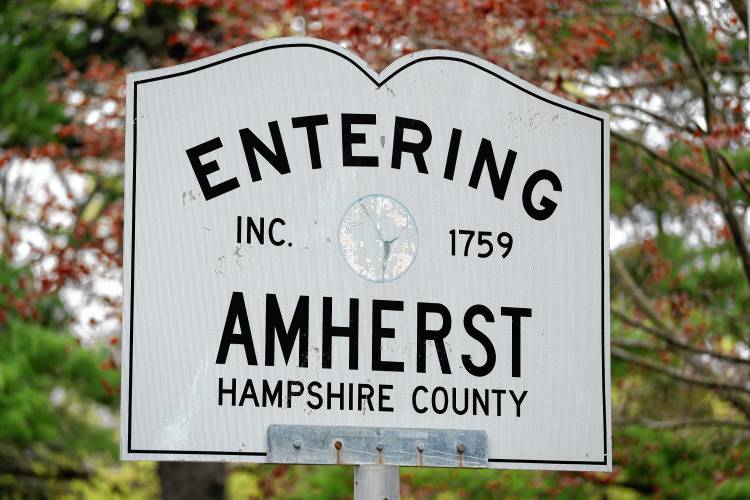
STAFF PHOTO
STAFF PHOTO
AMHERST — A charge for the municipal committee that will determine how best to make reparations for harms caused to people and their descendants by slavery in the United States will continue to be studied by a Town Council committee.
The Town Council Monday referred an overhauled charge, and a possible change in membership for the Amherst Reparations Committee, to the Governance, Organization and Legislation Committee for further examination. The committee, when formed, will examine proposals for using up to $100,000 annually to address harms perpetrated against residents of African heritage.
The unanimous decision by councilors came after At Large Councilor Mandi Jo Hanneke postponed a vote on the charge at the council’s Oct. 7 meeting and then brought extensive revisions that she said aim “to center the committee to and connect it to the repairing of harms for past actions, those caused by support of slavery and post Reconstruction attempts to continue slavery’s effects, and the harms suffered by those individuals who were enslaved.”
Hanneke said the previous version, already extensively reviewed by the council committee, focused on dismantling racism, which is forward looking, and didn’t require any proposals for reparations to be connected to existing harms or repairing harms for past conduct. The adjustments also would allow all funding for repairing harms to be insulated from potential legal challenges, she said.
Among the changes are expanding the committee from five to seven members, and with a focus on youth programming and housing, to have members from the Recreation Commission and Amherst Municipal Affordable Housing Trust, as well as the Human Rights Commission. The Town Council would have to vote on funding priorities, while the committee would consult regularly with the descendants of enslaved Amherst residents and residents of Amherst whose ancestors were enslaved in the United States to inform the program.
Former Town Councilor Michele Miller, a former member of the African Heritage Reparations Committee, said she appreciates that more councilors got involved in writing the amended charge. But she said the committee needs to be formed to begin its work.
“Theory and practice are two different things,” Miller said, pointing to the reparations program in Evanston, Illinois that has focused on housing.
“I just encourage us to not overthink it right now,” Miller said. “At this point what we need to do is get in there and start do the messy work, as best we can.”
Amilcar Shabazz, who also served on the reparations committee, said the committee shouldn’t be tied down to specific areas for funding.
“I really suggest not going down that path, and therefore, given that argument, not going down the path of expanding this committee to seven and seating people from Housing and Recreation and the Human Rights Commission,” Shabazz said. “A small nimble committee entirely focused on the work at hand, to bring forward proposals that meet all other language and criteria presented here tonight, is the better way to go.”
District 5 Councilor Bob Hegner said he agrees with concerns about expanding the committee and worries about identifying specific areas where the money should be directed. “I also found those to be constraining,” Hegner said. “I think the commission can decide itself what the priorities are.”
District 5 Councilor Ana Devlin Gauthier , who chairs the GOL committee, said she found it frustrating to have never received comments from other councilors about the committee’s charge and had some issues with Hanneke’s rewrite.
“It is wild to me that the word Black does not appear in this charge once, and the only time the words African Heritage are mentioned is when mentioning AHRA,” Devlin Gauthier said.
District 2 Councilor Pat De Angelis also asked why councilors didn’t reach out to GOL during the previous process. “I find it frustrating that you didn’t come to the committee,” De Angelis said,
But De Angelis said there is a lot in the new charge that she likes, giving flexibility to priorities and consulting with descendants of those who were enslaved and all Black residents. “They face regular discrimination based on the color of their skin. We know that, we know that, and it happens every day in Amherst,” De Angelis said.
At Large Councilor Ellisha Walker said she agrees strongly that the words Black and African Heritage shouldn’t be removed from the charge, and observed that a detailed report already made the connections to the harms caused in town. “We have the full history outlined in another report,” Walker said.
District 1 Councilor Cathy Schoen explained that she worked with Hanneke on the overhaul, which is necessary because public tax dollars would be used to meet the Town Council’s December 2020 resolution “Affirming the Town of Amherst’s Commitment to End Structural Racism and Achieve Racial Equity for Black Residents.”
“I saw this charge as starting to think of how do we spend the stabilization fund we’ve put up for reparations, and trying to link it back to the harm and the resolution we originally passed,” Schoen said.
“I actually think this replacement charge is a better charge because the focus is more limited,” said District 1 Councilor Ndifreke Ette, adding that it means a greater probability of finding what works and what doesn’t.
Scott Merzbach can be reached at smerzbach@gazettenet.com.
More News for you
By using this site, you agree with our use of cookies to personalize your experience, measure ads and monitor how our site works to improve it for our users
Copyright © 2016 to 2024 by H.S. Gere & Sons, Inc. All rights reserved.




